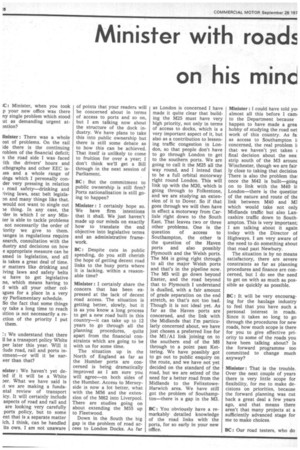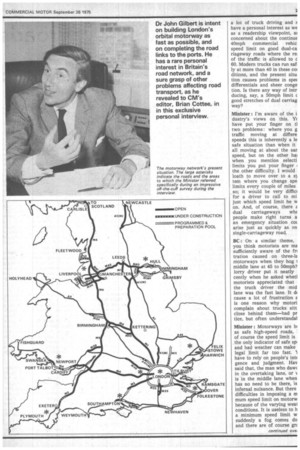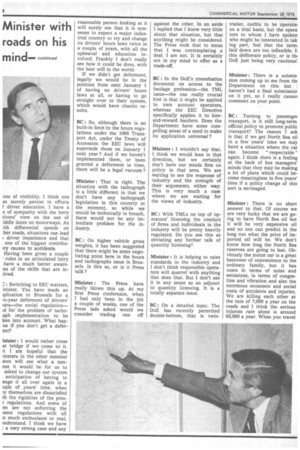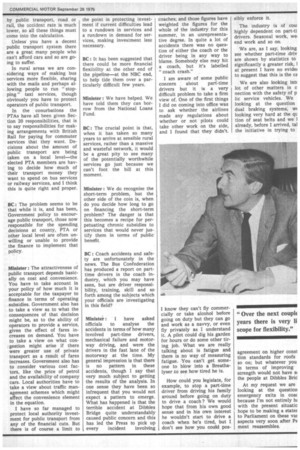Minister with roads on his mine
Page 28

Page 29

Page 30

Page 31

If you've noticed an error in this article please click here to report it so we can fix it.
C: Minister, when you took p your new office was there fly single problem which stood ut as demanding urgent at?.ntion?
linister : There was a whole ost of problems. On the rail ide there is the continuing roblem of the financial deficit; a the road side I was faced ith the drivers' hours and ichographs and other EEC isles and a whole range of iings which I personally conder very pressing in relation 1 road safety—drinking and -iving laws, seat belt legislaan and many things like that. would not want to single out le thing. In any case, the .der in which I or any Minter is able to tackle problems not necessarily the order of iority we give to them. langes in regulations require search, consultation with the dustry and decisions on how e appropriate measure can be amed in legislation, and all is takes a great deal of time. itmatters like drinking and lying laws and safety belts have to get legislative. ne, which means having to d with all your other coligues for a place in a very sy Parliamentary schedule. So the fact that some things ly take a long time to reach iition is not necessarily a rection of the priority I put them.
: We understand that there ll be a transport policy White per later this year. Will it :hide road, rail and ports in5tment—or will it be narver than that?
nister : We haven't yet deLed if it will be a White Der. What we have said is 1 we are making a fundantal review of transport icy. It will certainly include aspects of road and rail and are looking very carefully ports policy, but to some ent that is a separate matter ich, I think, can be handled its own. I am not unaware of points that your readers will be concerned about in terms of access to ports and so on, but I am talking now about the structure of the dock industry. We have plans to take this into public ownership but there is still some debate as to how this can be achieved. That itself is unlikely to come to fruition for over a year; I don't think we'll get a Bill through in the next session of Parliament.
BC: But the commitment to public ownership is still firm? Ports nationalisation is still going to happen?
Minister • I certainly hope so. We have firm intentions that it shall. We just haven't made up our minds on exactly how to translate the end objective into legislative terms and an administrative framework.
BC: Despite cuts in public spending, do you still cherish the hope of getting decent road links to the busy ports where it is lacking. within a reasonable time?
Minister : I certainly share the concern that has been expressed at the lack of decent road access. The situation is getting better, slowly, but it is as you know a long process to get a new road built in this country—it can take up to 12 years to go through all the planning procedures, quite apart from the financial constraints which are going to be with us for some time.
The situation up in the North of England as far as the Humber ports are concerned is being dramatically improved as I am sure you will agree—on both sides of the Humber. Access to Merseyside is now a lot better, what with the M56 and the extension of the M62 into Liverpool. There are studies going on about extending the M55 up to Fleetwood.
Down in the South the big gap is the problem of road access to London Docks. As far as London is concerned I have made it quite clear that building the M25 must have very high priority, not only in terms of access to docks, which is a very important aspect of it, but also as a contribution to lessening traffic congestion in London, so that people don't have to go through London to get to the southern ports. We are going to call it the M25 all the way round, and I intend that to be a full orbital motorway right round London. This will link up with the M20, which is going through to Folkestone, and we are studying an extension of it to Dover. So if that goes through we will then have in effect a motorway from Carlisle right down to the South East. That leaves two or three other problems. One is the question of access to Southampton, the other is the question of the Haven ports and also possibly Plymouth and the Welsh ports, The M4 is going right through to all the major Welsh ports and that's in the pipeline now. The M5 will go down beyond Exeter, and the road beyond that to Plymouth I understand is dualled, with a fair amount of grade separation on the end stretch, so that's not too bad. Though it is not ideal yet. As far as the Haven ports are concerned, and the link with the Midlands that I'm particularly concerned about, we have just chosen a preferred line for the M1 /AI link joining on to the southern end of the M6 through to a point past Kettering. We have possibly got to go out to public enquiry on the route, and we have not yet decided on the standard of the road, but we are seized of the need for a better road from the Midlands to the FelixstoweHarwich area. We have still got the problem of Southampton—there is a gap in the M3.
BC: You obviously have a remarkably detailed knowledge of the road links with the ports, for so early in your new office. Minister : I could have told yoi almost all this before I calm to the Department because happen to have made a grea hobby of studying the road net work of this country. As fa: as access to Southampton h concerned, the real problem h that we haven't yet taken final decision about the flex strip south of the M3 arounc Winchester, though we are fair ly close to taking that decision There is also the problem that once the M42 is built—goirq on to link with the M40 in London—there is the question of the nature and route of the link between M40 and M2 which would take not only Midlands traffic but also Lancashire traffic down to Southampton. This is very important; I am talking about it again today with the Director of Highways. I am very aware of the need to do something about that road past Newbury.
The situation is by no means satisfactory, there are severe constraints as far as planning procedures and finance are concerned, but I do see the need to get on with as much as possible as quickly as possible.
BC: It will be very encouraging for the haulage industry to feel that you have such a personal interest in roads. Since it takes so long to go through the procedures for new roads, how much scope is there for you to give effective priority to some of the roads you have been talking about? Is the forward programme too committed to change much anyway?
Minister : That is the trouble. Over the next couple of years there is very little scope for flexibility, for me to make decisions on priorities, because the forward planning was cut back a great deal a few years ago, and that means there aren't that many projects at a sufficiently advanced stage for me to make choices.
BC: Our road testers, who do a lot of truck driving and s have a personal interest as we as a readership viewpoint, al concerned about the continue 40mph commercial vehic speed limit on good dual-ca riageway roads where the re: of the traffic is allowed to c 60. Modern trucks can run saf. ly at more than 40 in these col ditions, and the present situ, tion causes problems in speE differentials and sheer conge tion, Is there any way of intr ducing, say, a 50mph limit c good stretches of dual carriag way?
Minister : I'm aware of the i dustry's views on this. Yc have put your finger on tl two problems : where you g traffic moving at differe speeds this is inherently a le safe situation than when it all moving at about the sar speed, but on the other hai when you mention selecti limits you put your finger the other difficulty. I would loath to move over to a s3 tern where you change spe limits every couple of miles so; it would be very diffici for a driver to call to mi just which speed limit he w on. And, of course, there a dual carriageways whE people make right turns a an emergency situation cot arise just as quickly as on single-carriageway road.
BC: On a similar theme, you think motorists are ma sufficiently aware of the fri tration caused on three-la motorways when they hog I middle lane at 45 to 50mph? lorry driver put it neatly cently when he asked whet] motorists appreciated that the truck driver the mid lane was the fast lane. It d( cause a lot of frustration a is one reason why motori complain about trucks sitt close behind them—bad pr tice, but often understandal Minister : Motorways are bi as safe high-speed roads, of course the speed limit is the only indicator of safe sp, and bad weather can make legal limit far too fast, have to rely on people's intE gence and judgment. Hay said that, the man who dawc in the overtaking lane, or is in the middle lane when has no need to be there, is infernal nuisance. But there difficulties in imposing a m mum speed limit on motorw because of the varying weal conditions. It is useless to h a minimum speed limit w suddenly a fog comes do and there are of course gn ons of visibility. I think one an merely persist in efforts f driver education. I have a it of sympathy with the lorry rivers' view on the use of Addle lanes on motorways. As ith differential speeds on :her roads, situations can lead driver impatience and that one of the biggest contribuory causes to accidents.
Having been given a couple ' rides in an articulated lorry have a much better awarens of the skills that are in&ed.
Switching to EEC matters, mister. You have made an iplication to Brussels for a ,o-year deferment of drivers' lurs—the social regulation— id for the problem of tachoaph implementation to be ken into account. What hapns if you don't get a deferent?
mister: I would rather cross at bridge if we, come to it. Lt I am hopeful that the nisters in the other member ates will see what a nonnse it would be for us to asked to change our system anticipation of having to ange it all over again in a uple of years' time, when .v themselves are dissatisfied th the rigidities of the prest regulations. And some of nin are not enforcing the sent regulations with all it much enthusiasm or zeal, mderstand. I think we have a very strong case and any reasonable person looking at it will surely see that it is nonsense to expect a major industrial country to try and change its drivers' hours laws twice in a couple of years, with all the upheaval and education involved. Frankly I don't really see how it could be done, with the best will in the world.
If we didn't get deferment, legally we would be in the position from next January 1 of having no drivers' hours laws at all, or having to go straight over to their system, which would have chaotic results.
BC: So, although there is no built-in limit to the hours regulations under the 1968 Transport Act, under the Treaty of Accession the EEC laws will supersede those on January 1 next year ? And if we haven't implemented them, or been granted a deferment in time, there will be a legal vacuum ?
Minister : That is right. The situation with the tachograph is a little different in that we don't have any tachograph legislation in this country at the moment, so while we would be technically in breach, there would not be any immediate problem for the industry.
BC: On higher vehicle gross weights, it has 'been suggested that there might be some negotiating point here in the hours • and tachographs issue in Brussels. Is this so, or is it Press talk ?
Minister : The Press have really blown this up. At my first Press conference, when I had only been •in the job a couple of weeks, one of the Press lads asked would we consider trading one off against the other. In an aside I replied that I knew very little about that situation, but that anything might be considered. The Press took that to mean that I was contemplating a deal. I am not. It is certainly not in my mind to offer as a trade-off.
BC: In the DoE's consultation document on access to the haulage profession—the TIVIL issue—the one really crucial hint is that it might be applied to own account operators, whereas the EEC Directive specifically applies it to hireand-reward ,hauliers. Does the Department have some compelling sense of a need to make its application universal ?
Minister : I wouldn't say that. I think we would lean in that direction, but we certainly don't haNie our minds firm on policy in that area. We are waiting to see the response of industry and the strength of their arguments, either way. This is very much a case where we are waiting for the views of industry.
BC: With TMLs on top of operators' licensing the conduct of firms and individuals in the industry will be pretty heavily regulated. Do you see this as obviating any further talk of quantity licensing?
Minister : It is helping to raise standards in the industry and I don't think responsible operators will quarrel with anything that does that. But I don't see it in any sense as an adjunct to quantity licensing. It is a totally separate issue.
BC: On a detailed topic. The DoE has recently permitted double-bottom, that is twin trailer, outfits to be operate( on a trial basis, but the opera tors to whom I have spoken who might be interested in tak ing part, feel that the term: laid down are too inflexible. this deliberate policy, or is th( DoE just being very cautious Minister : There is a submis sion coming up to me from th( Department on this but i haven't had a final submissior on it yet, so I really cannoi comment on your point.
BC: Turning to passenget transport, is it still long-term official policy to promote public transport? The reason I ask is that if we get North Sea oil in a few years' time we may have a situation where the car can become " respectable" again. I think there is a feeling at the back of bus managers' minds that they may be making a lot of plans which could become meaningless in five years' time if a policy change of this sort is envisaged.
Minister : There is no short answer to that. Of course we are very lucky that we are going to have North Sea oil but it will be very expensive oil and no one can predict in the long run what the price of imported oil will be. We don't know how long the North Sea reserves are going to last. Obviously the motor car is a great bestower of convenience to the ordinary family, but it has costs in terms of noise and emissions, in terms of congestion and vibration and also the enormous economic and social costs of accidents and injuries. We are killing each other at the rate of 7,000 a year on the roads and I think the serious injuries rate alone is around 60,000 a year. When you travel by public transport, road or rail, the accident rate is much lower, so all these things must come into the calculation.
Unless you have a decent public transport system there are a great many people who can't afford cars and so are going to suffer.
In rural areas we are considering ways of making bus services more flexible, sharing with the mails and perhaps allowing people to run " stopping " taxi services, though obviously you have to protect operators of public transport.
In the conurbations the PTAs have all been given Section 20 responsibilities, that is to say responsibilities for making arrangements with British Rail for paying for commuter services that they want. Decisions about the amount of public transport are being taken on a local level—the elected PTA members are having to decide how much of their transport money they want to spend on bus services or railway services, and I think this is quite right and proper.
BC: The problem seems to be that while it is, and has 'been, Government policy to encourage public transport, those now responsible for the spending decisions at county, PTA or other local level are often unwilling or unable to provide the finance to implement that policy.
Minister : The attractiveness of public transport depends basically on cost and convenience. You have to take account in your policy of how much it is acceptable for the taxpayer to finance in terms of operating subsidies. Government also has to take a view as to what the consequences of that decision might be, as to the ability of operators to provide a service, given the effect of fares increases on demand. You have to take a view on what congestion might arise if there were greater use of private transport as a result of fares increases. Government also has to consider various cost factors, like the price of petrol and the availability of company cars. Local authorities have to take a view about traffic management schemes which might affect the convenience element in the equation.
I have so far managed to protect local authority investment for public transport from any of the financial cuts. But there is of course a limit to the point in protecting investment if current difficulties lead to a rundown in services and a rundown in demand for services, making investment less necessary.
BC: It has been suggested that there could be more financial flexibility at the other end of the pipeline—at the NBC end, to help tide them over a particularly difficult few years.
Minister : We have helped. We have told them they can borrow from the National Loans Fund.
BC: The crucial point is that, when it has taken so many years to arrive at sensible rural services, rather than a massive and wasteful network, it would be a great pity to see many of the potentially worthwhile services go just because we can't foot the bill at this moment.
Minister: We do recognise the short-term problem, but the other side of the coin is, when do you decide how long to go on financing the short-term problem? The danger is that this becomes a recipe for perpetuating chronic subsidies to services that would never justify them in terms of public benefit.
BC: Coach accidents and safety are unfortunately in the news. The Bus Confederation has produced a report on parttime drivers in the coach industry, which you may have seen, but are driver responsibility, training, skill and so forth among the subjects which your officials are investigating in this field?
Minister : I have asked officials to analyse the accidents in terms of how many involved part-time drivers, mechanical failure and motorway driving, and were the drivers in the fast lane of the motorway at the time. My general impression is that there is no pattern in these accidents, though I say that very much subject to getting the results of the analysis. In one sense they have been so infrequent that you would not expect a pattern to emerge. What has happened is that the terrible accident at Dibbles Bridge quite understandably caused public concern and this has led the Press to pick up every incident involving coaches; and those figures have weighted the figures for the whole of the industry for this summer, in an unrepresentative degree. In quite a lot of accidents there was no question of either the coach or the driver being in any way to blame. Somebody else may hit a coach, but it's labelled "coach crash."
I am aware of some public concern about part-time drivers but it is a very difficult problem to take a firm view of. One of the first things I did on coming into office was to ask whether the airlines made any regulations about whether or not pilots could take other work on the side, and I found that they didn't.
I know they can't fly commercially or take alcohol before going on duty but they can go and work as a navvy, or even fly privately as I understand it. A pilot could dig his garden for hours or do some other tiring job. What we are really talking about is fatigue and there •is no way of measuring fatigue. You can't get someone to blow into a Breathalyser to see how tired he is.
How could you legislate, for example, to stop a part-time driver from driving his family around before going on duty to drive a coach ? We would hope that from his own good sense and in his own interest he wouldn't start to drive a coach when he's tired, but I don't see how you could pos sibly enforce it.
The industry is of cou highly dependent on part-ti drivers. Seasonal work, we end work and so on.
We are, as I say, looking see whether part-time driv are shown by statistics to significantly a greater risk, 1 at present I have no evidei to suggest that this is the co We are also looking intt lot of other matters in c nection with the safety of p lic service vehicles. We looking at the question dual braking systems, w( looking very hard at the qu tion of seat belts and we I already, before I arrived, tal the initiative in trying to agreement on higher const tion standards for roofs so on; but whatever you in terms of improving strength would not have the people at Dibbles Brid At my request we are looking at the question emergency exits in coat because I'm not entirely lu with the present situatio hope to be making a stater to Parliament on these var aspects very soon after Pa ment reassembles.




































































































